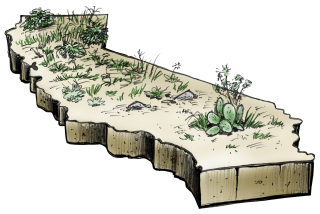Town’s Rationing Plan--10 Gallons a Person Daily : Drought: Orange Cove, which relies solely on federal water sources, will get only 10% of its normal supply.
- Share via
ORANGE COVE, Calif. — Flush your toilet twice and you’ve used up your daily water allotment. Take a shower and you’ve used it up for two days. Do a few loads of laundry and there goes your water for a week.
In the small San Joaquin Valley town of Orange Cove, water cutbacks have been so severe that residents have been advised to use no more than 10 gallons a day. The average Los Angeles resident uses more than 10 times that amount.
Ten gallons a day is such a minuscule amount, many Orange Cove residents say that no matter how much they conserve they will never be able to cut back that much.
“I drink that much coffee a day,” said Leroy Anderson outside the town’s only bank. “Ten gallons doesn’t last long in my house.”
Even city officials are skeptical that it can be done in a town with no operating water meters, and no real way of enforcing reductions among its largely low-income residents, many of whom are unemployed farm workers.
“I realize it’s pretty well impossible,” said City Administrator Alan Bengyel, shrugging. “But, theoretically, that’s all the water we can spare.”
Bengyel called for such drastic measures because he learned last month that Orange Cove, which relies entirely on federal water sources, will receive only 10% of its normal supplies this year. He quickly calculated that if every Orange Cove resident cut back 90%, they would be down to 10.2 gallons a day.
A 90% cutback in a city’s sole water supply is unprecedented in California, state water officials say. The Metropolitan Water District that serves Southern California, for example, this week ordered 50% cutbacks in water deliveries to agencies in April--an amount described by officials as “beyond what anyone would have dreamed of.”
After Bengyel learned of Orange Cove’s cutbacks he sent out bilingual notices informing residents of their daily allotment and offering conservation tips. But in the absence of active meters, residents are on the honor system, and, so far, honor is losing out.
Since the water reduction announcement in mid-February, residents are still using more than an average of 80 gallons a day per person--a cutback of only 20%. At this rate, the community will run out of water by summer, Bengyel said. As a result, he is frantically searching for emergency supplies to get them through the rest of the year.
While many residents say they are trying to conserve, the town’s water supply is not their primary concern. More than a third of the town’s 6,000 residents are unemployed as a result of the freeze last December that destroyed the area’s citrus crop. And the recent water cutbacks to local farmers--also 90%--created more unemployment because most have had to scale back their operations.
Thousands of unemployed fruit pickers and packinghouse workers are months behind on their rent, utility and water bills. Many don’t have enough money to buy groceries.
“We could put in water meters and raise water rates, but what good would it do?” asked Mayor Victor Lopez. “There are so many people already who can’t pay their water bills, we can’t ask them to pay more. And because so many people are unemployed and staying home . . . it’s harder for them to conserve.”
Orange Cove’s water cutbacks have been so severe because it receives all of its supplies from the Friant-Kern Canal, a Central Valley Project source designed primarily for agriculture. This source can provide only 10% of normal supplies because the southern Sierra--which feeds the Friant Dam--has received a much smaller percentage of normal rainfall than the mountains farther north.
The only other city that receives water from this source is Lindsay, but it has several productive wells in town that will make up for much of the cutbacks. Orange Cove, however, has minimal ground-water supplies and only about 10 of Orange Cove’s residents have wells on their properties, says City Clerk Betty Hutton. So the city is considering buying water from other irrigation districts, trading reclaimed water from its sewage treatment plant for potable water and digging extremely deep wells in a search for ground water.
City officials in Orange Cove, a largely Latino farming town about 35 miles southeast of Fresno, are typical of many California politicians--they assumed there always would be enough water. Five years ago the city even decided to shut off all of its residential water meters.
“Water was something you never worried about around here,” said Sue Jones, former president of the Chamber of Commerce. “People just sort of took for granted that they’d have all the water they wanted.”
Orange Cove has a limited budget, Bengyel said. Cutting off the water meters was one way to save money, he said, by eliminating the need for meter readers. In the past, he said, there was no incentive to conserve because the city’s water was supplied on a “use it or lose it” basis. Orange Cove received a designated amount of water each year, and, whether residents used all or a portion, the city paid the same price.
But now, as a result of the five-year drought, Orange Cove officials are forced to view water as a valuable commodity for the first time. Conservation may soon become a way of life, and when the town’s financial crisis is eased, city officials intend to reconnect the water meters.
Even before the recent water cutbacks, the town faced a crisis. The freeze last December, when temperatures dropped to record lows, destroyed most of the area’s orange crops and cost San Joaquin Valley farmers almost $500 million. The ongoing drought exacerbated the freeze because the trees were less tolerant of the low temperatures, and some farmers couldn’t irrigate their fields to combat the frost.
Many farmers lost their entire crop. Now the thousands of Orange Cove residents who traditionally have picked fruit and labored in the groves are unemployed.
And farmers who lost trees are not planting new ones because of the recent water cutbacks. Most have laid off employees and reduced all facets of their operations until they are assured of new water supplies.
“We bulldozed 40 acres of lemon trees we lost in the freeze, put them in a pile and burned them,” said rancher Harvey Bailey. “Until we get some more water, we’re going to leave all that land vacant.”
Residents are concerned that their water supplies have been reduced, but they are more concerned that agriculture received the same 90% cutbacks, said Mayor Lopez. They know that until farmers get more water, there will be no work.
The jobless problem also has been exacerbated by water cutbacks to businesses in Orange Cove. A tomato paste company and a fruit cocktail cannery that had planned to build plants in town have moved elsewhere because of the lack of water, Lopez said.
The town’s six packinghouses--usually thrumming with activity this time of year--are all shut down. The orange groves that surround the town--usually filled with pickers dropping oranges into bins, forklift drivers carrying the bins to the trucks, and truck drivers hauling the bins to packinghouses--are now desolate. A carpet of decaying oranges, desiccated and shriveled by the freeze, now line the groves. A breeze carries the smell of rotting fruit into town.
On a recent morning, a dozen residents who were unable to pay their bills were lined up outside the Orange Cove Community Center, hoping for some assistance. Many were hungry and didn’t have the money to buy groceries for their families. The United Way recently donated a ton of rice and a ton of beans to residents. It was gone in two days.
Lopez sat at his desk at the community center and counseled a woman who was two months behind on her gas, light and water bills and couldn’t make her house payment. She and her husband, both of whom have worked in the orange groves for years, were recently laid off.
“The farmers,” she said, “all tell us the same thing: ‘Come back when it rains.’ ”
More to Read
Sign up for Essential California
The most important California stories and recommendations in your inbox every morning.
You may occasionally receive promotional content from the Los Angeles Times.













